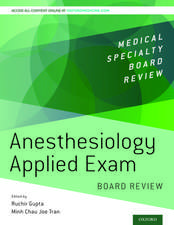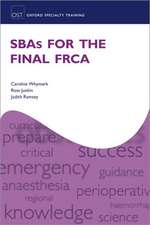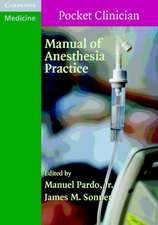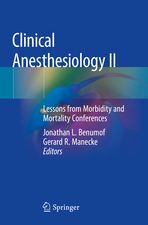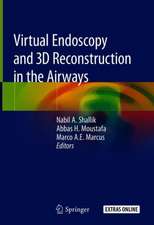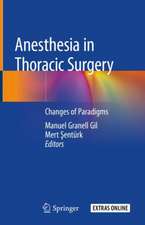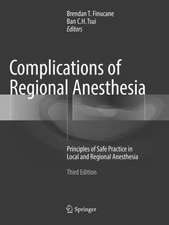The Difficult Airway: An Atlas of Tools and Techniques for Clinical Management
Editat de David B. Glick, Richard M Cooper, Andranik Ovassapianen Limba Engleză Paperback – 23 aug 2016
| Toate formatele și edițiile | Preț | Express |
|---|---|---|
| Paperback (1) | 852.56 lei 38-44 zile | |
| Springer – 23 aug 2016 | 852.56 lei 38-44 zile | |
| Hardback (1) | 2002.39 lei 38-44 zile | |
| Springer – 5 dec 2012 | 2002.39 lei 38-44 zile |
Preț: 852.56 lei
Preț vechi: 897.42 lei
-5% Nou
Puncte Express: 1279
Preț estimativ în valută:
163.19€ • 177.32$ • 137.17£
163.19€ • 177.32$ • 137.17£
Carte tipărită la comandă
Livrare economică 18-24 aprilie
Preluare comenzi: 021 569.72.76
Specificații
ISBN-13: 9781493939787
ISBN-10: 1493939785
Pagini: 295
Ilustrații: XVIII, 295 p.
Dimensiuni: 210 x 279 mm
Ediția:Softcover reprint of the original 1st ed. 2013
Editura: Springer
Colecția Springer
Locul publicării:New York, NY, United States
ISBN-10: 1493939785
Pagini: 295
Ilustrații: XVIII, 295 p.
Dimensiuni: 210 x 279 mm
Ediția:Softcover reprint of the original 1st ed. 2013
Editura: Springer
Colecția Springer
Locul publicării:New York, NY, United States
Cuprins
1.The Difficult Airway: Definitions and Algorithms.- 2.The Expected Difficult Airway.- 3.The Role of Awake Intubation.- 4.Unanticipated Difficult Direct Laryngoscopy: Methods to Improve Its Success.- 5.The Role of Rigid Fiberoptic Laryngoscopy.- 6.Role of Rigid Video Laryngoscopy.- 7.The Role of the Supraglottic Airway.- 8.The Role of Flexible Bronchoscopy.- 9.The Role of Optical Stylets.- 10.The Role of the Lightwand.- 11.Role of retrograde intubation.- 12.The Role of the Combitube and Laryngeal Tube.- 13.The Role of Transtracheal Jet Ventilation.- 14.The Role of Surgical Airway Access.- 15.Evaluation and Management of the Difficult Pre-Hospital Airway.- 16.Extubation of the Difficult Airway.
Recenzii
From the reviews:
“This multiauthored book describes airway management strategies for patients where mechanical control of the airway is deemed difficult. … Practitioners in emergency medicine, prehospital care, anesthesiology, surgery, pulmonology, and critical care medicine are an appropriate audience. … This is an excellent introduction to consensus-based protocols for airway management that integrates available technologies to manage this problem. … This is a worthy contribution for the material it collects.” (David J. Dries, Doody’s Book Reviews, November, 2013)
“This multiauthored book describes airway management strategies for patients where mechanical control of the airway is deemed difficult. … Practitioners in emergency medicine, prehospital care, anesthesiology, surgery, pulmonology, and critical care medicine are an appropriate audience. … This is an excellent introduction to consensus-based protocols for airway management that integrates available technologies to manage this problem. … This is a worthy contribution for the material it collects.” (David J. Dries, Doody’s Book Reviews, November, 2013)
Textul de pe ultima copertă
The Difficult Airway provides comprehensive textual and visual coverage of how to deal with patients who have expected or unexpected difficult airways.
The book begins with a review of current definitions of the difficult airway, its incidence, and the evolution of algorithms to facilitate its management. The chapters that follow offer a comprehensive update on the techniques and concepts described in the American Society of Anesthesiologists’ Difficult Airway Algorithm. Noted experts in each of the techniques have been recruited by the book editors to present the information. Figures throughout the book illustrate important points and procedures.
This is a wonderful resource for health care professionals who are concerned with the management of the difficult airway, including anesthesiologists, intensive care physicians, emergency room physicians, nurses, and out-of-hospital first responders.
The book begins with a review of current definitions of the difficult airway, its incidence, and the evolution of algorithms to facilitate its management. The chapters that follow offer a comprehensive update on the techniques and concepts described in the American Society of Anesthesiologists’ Difficult Airway Algorithm. Noted experts in each of the techniques have been recruited by the book editors to present the information. Figures throughout the book illustrate important points and procedures.
This is a wonderful resource for health care professionals who are concerned with the management of the difficult airway, including anesthesiologists, intensive care physicians, emergency room physicians, nurses, and out-of-hospital first responders.
Caracteristici
Chapters are correlated to the ASA algorithm Numerous full color illustrations provide step-by-step instruction Written by experts in the field Includes supplementary material: sn.pub/extras


